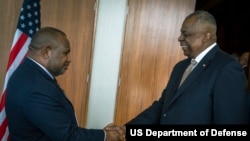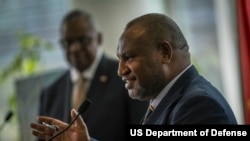Papua New Guinea’s leadership is promising “cascading” benefits from growing military and security cooperation with the United States following the first visit by a sitting U.S. defense secretary, while downplaying any risk to the country’s close economic ties to China.
Prime Minister James Marape Thursday praised the PNG-U.S. Defense Cooperation Agreement, signed in May, agreeing with assessments by senior U.S. defense officials that his country’s National Parliament would ratify the deal in short order.
He also lauded a separate so-called shiprider agreement that will allow PNG personnel to ride aboard U.S. Coast Guard vessels to help protect the country’s fishing rights.
"The work starts now," Marape said, standing alongside U.S. Defense Secretary Lloyd Austin following their meeting in Port Moresby.
“Our defense capacity must be built up,” he added. “It is a partnership of choice that we made in respect to our defense cooperation but of course with the cascading benefit that links to [our] economy and, more importantly, key economic infrastructure.”
PNG and U.S. officials said Thursday that both countries have started to look at areas where investments can be made to improve infrastructure and military readiness.
The 15-year agreement is also expected to allow for a greater U.S. military presence on the island as well as joint exercises, and greater coordination in the case of humanitarian crises.
But Marape said the U.S. forces in PNG will be there only on a rotational basis, a point Austin emphasized.
"I want to be clear. We're not seeking permanent basing in PNG," Austin said .
"We have a long-standing relationship with Papua New Guinea,” he added. "Our goal is to make sure we strengthen PNG's ability to protect itself and defend its interests. … We both really respect and value the [international] rules-based order."
Austin also said the U.S. would respect Papua New Guinea’s decision to remain nuclear-free, and not send any U.S. nuclear capabilities to the island.
For now, though, the U.S. is moving ahead with the shiprider agreement, with a U.S. Coast Guard cutter scheduled to arrive in PNG next month to help counter illegal fishing, much of which has been blamed on China.
However, while the move was welcomed by Marape, some Papua New Guinea politicians fear the increased cooperation with the U.S. could rock the country’s ties with China.
“There has been widespread public scrutiny of some expansive language in the recent agreement and less focus on the fact that everything must be mutually agreed,” Brian Harding with the Washington-based U.S. Institute of Peace told VOA via email.
“Pacific Island countries welcome this newfound attention but are wary of the potential destabilizing downsides of being caught in the middle of competition between major powers,” Harding said. “They also are clear that they do not want there to be a ‘militarization’ of the Pacific, something Chinese propaganda has seized on, despite China’s own efforts in Solomon Islands.”
Marape, though, played down such concerns.
"They have no issue whatsoever with us having defense relationship with USA," Marape said of how the agreements with the U.S. are being viewed in Beijing. "They have not made any requests to us for military relationship.”
Marape also sought to quell fears that Washington’s interest in the country is really about positioning forces in case of a Chinese invasion of Taiwan.
“This is not about setting up for war," Marape said. “USA does not need PNG’s ground to be a launching pad for any offensive anywhere in the world.”





